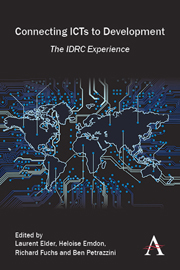Book contents
- Frontmatter
- Contents
- Acknowledgments
- Introduction Part I From Heresy to Orthodoxy: ICT4D at IDRC
- Introduction Part II From Beginning to End to Beginning Again
- Chapter 1 Catalyzing Access through Social and Technical Innovation
- Chapter 2 Catalyzing Access via Telecommunications Policy and Regulatory Research
- Chapter 3 Access to Knowledge as a New Paradigm for Research on ICTs and Intellectual Property
- Chapter 4 ICTs and Social Inclusion
- 5 Access and Usage of ICTs by the Poor (Part I)
- Chapter 6 Local Economic Opportunities and ICTs: How ICTs Affect Livelihoods (Part II)
- Chapter 7 Research on eHealth across Health Systems: Contributions to Strengthen a Field
- Chapter 8 Making the Grade: The Role of ICTs in Providing Access to Knowledge
- Chapter 9 E-Government for Development: ICTs in the Public Sector and the Evolving Citizen–Government Relationship
- Chapter 10 Innovations in Evaluating ICT4D Research
- Chapter 11 Conclusions: A Decade of Innovation that Matters
- Epilogue Into the Future: New Opportunities and Threats in a Global Networked Society
- Author Biographies
Chapter 3 - Access to Knowledge as a New Paradigm for Research on ICTs and Intellectual Property
from Introduction Part II - From Beginning to End to Beginning Again
Published online by Cambridge University Press: 05 March 2014
- Frontmatter
- Contents
- Acknowledgments
- Introduction Part I From Heresy to Orthodoxy: ICT4D at IDRC
- Introduction Part II From Beginning to End to Beginning Again
- Chapter 1 Catalyzing Access through Social and Technical Innovation
- Chapter 2 Catalyzing Access via Telecommunications Policy and Regulatory Research
- Chapter 3 Access to Knowledge as a New Paradigm for Research on ICTs and Intellectual Property
- Chapter 4 ICTs and Social Inclusion
- 5 Access and Usage of ICTs by the Poor (Part I)
- Chapter 6 Local Economic Opportunities and ICTs: How ICTs Affect Livelihoods (Part II)
- Chapter 7 Research on eHealth across Health Systems: Contributions to Strengthen a Field
- Chapter 8 Making the Grade: The Role of ICTs in Providing Access to Knowledge
- Chapter 9 E-Government for Development: ICTs in the Public Sector and the Evolving Citizen–Government Relationship
- Chapter 10 Innovations in Evaluating ICT4D Research
- Chapter 11 Conclusions: A Decade of Innovation that Matters
- Epilogue Into the Future: New Opportunities and Threats in a Global Networked Society
- Author Biographies
Summary
Why is an authorized copy of a Hollywood film worth $15 in the United States offered for sale at the same price in a much poorer country like India? Factoring in purchasing power parity, is it really surprising that consumers refuse to pay the roughly $641 price tag and turn instead to piracy to satisfy their understandable demand for access to foreign culture? What is being done in developing countries, effectively or ineffectively, to enforce laws designed to deal with such dilemmas? Maybe more importantly, if enforcement efforts succeeded in stamping out piracy, what would happen to the jobs, income and gray market spinoffs generated in the informal sectors where this activity mostly takes place? Could these losses be offset by net social or economic gains through innovation or formalization in low-income countries that better comply with the legal standards set by the world's most developed nations?
And might this debate be different if we were talking about education instead of entertainment? For example, how do students in Senegal behave when confronted with conflicting information about acceptable practices for photocopying textbooks and other educational materials? How should they behave? They're explicitly asked to photocopy books instead of taking them home or tearing out the pages but, at the same time, by so doing, they learn that most copy shops around post-secondary campuses, not to mention their own libraries, operate illegally. Do students at the wealthiest South African universities or researchers at renowned institutions like the Bibliotheca Alexandrina in Egypt face similar challenges?
- Type
- Chapter
- Information
- Connecting ICTs to DevelopmentThe IDRC Experience, pp. 75 - 90Publisher: Anthem PressPrint publication year: 2013



